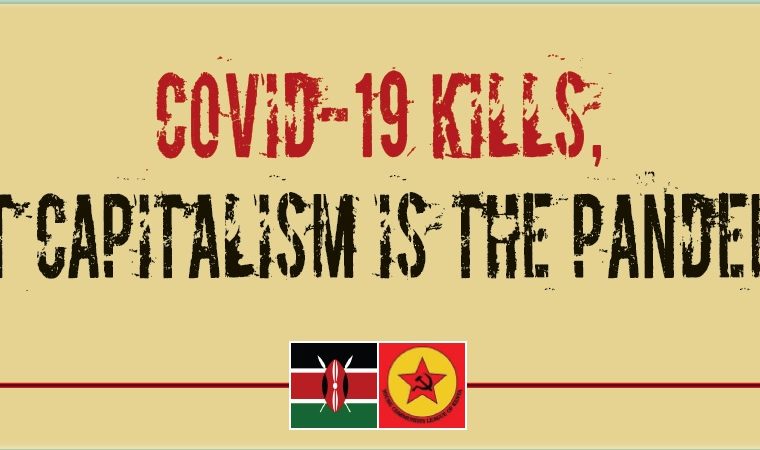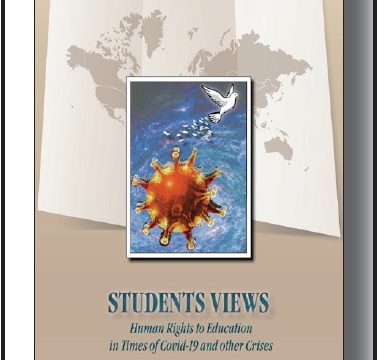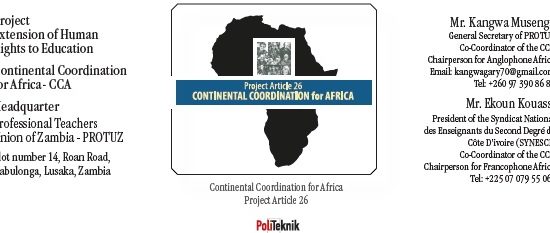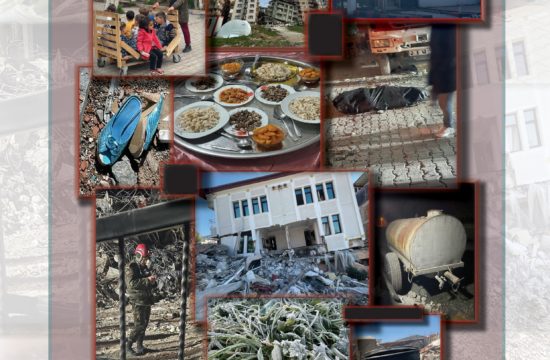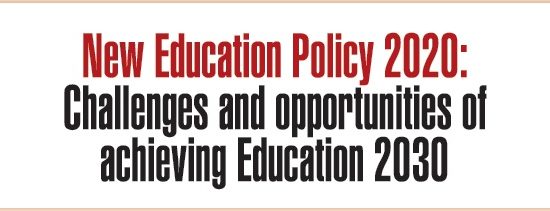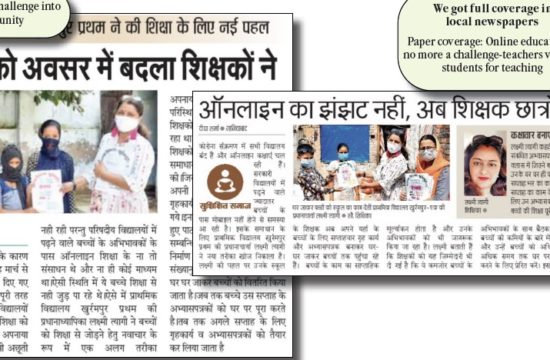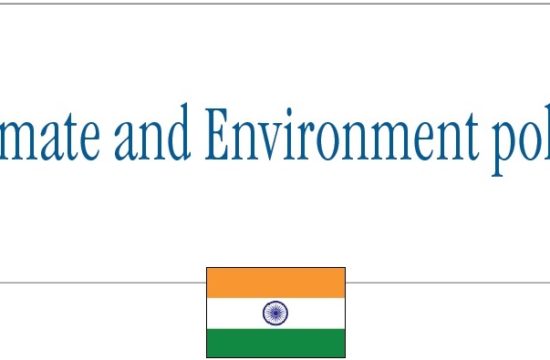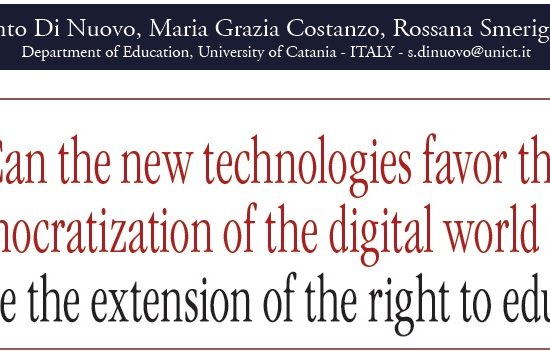Wahome Waringa
National Vice Chairperson – Young Communist Leagues – KENYA
There was a time I lived in darkness, in routine. I thought the world was what I could see. But now, as a student of Marxism and a sceptic, I understand that all senses can deceive us. To understand the objective world as a Marxist and a sceptic, we need to constantly compare our subjective thoughts to the objective reality—every time referring to history to reflect on the present and to predict the future. To penetrate reality is to understand the science of all reality – the philosophy of the historical and dialectical, not just the metaphysical elements.
Covid-19 has exposed the irrational nature of capitalism in a very unprecedented way. With the increasing levels of poverty and chaos, the enthusiasm for change is born. Last year, with the first wave of Covid -19, the president gave a directive locking down and subjecting a curfew on the Kenyan fold. The working class lost their jobs, which ultimately increased the cost of living. The number of evictions and homelessness was nauseating. The number of families that broke down was distressing. The total picture from these lockdowns was grim: Kenyans were barely surviving.
A year later and in the third wave of the virus, the president gave a similar directive locking down infected areas and subjecting a curfew that would leave the informal sector with no sense of direction. Therefore, one would wonder, would the state claim lack of knowledge on the effect of the lockdown curfew on Kenyans? Did the state not give any care or regard towards the welfare of the Kenyan fold? Having gone through the first wave and seen the grim picture, locking Kenyans down and subjecting them to curfews devoid of reparations or an alternative source of livelihood is beyond cruel. And deliberately cruel, for that matter.
The people collectively surrender their power to the government endowed with carrying on operations for the benefit of the majority of Kenyans. At a time of crisis, the Kenyan government undertook a superfluous operation at the expense of the Kenyan working class. With the closure and sudden shrinking of businesses, the government should have cushioned the citizens from the blow caused by layoffs and the increased cost of living to prevent an economic crisis.
Instead, we saw the Federation of Kenyan Employers (FKE), through a tripartite between the ministry of labour and social protection and The Central Organization of Trade Unions (COTU), enter into an agreement. According to the parties, the deal was a gift to employers and employees: the reality was otherwise. From that agreement, only the employers, through their businesses, were cushioned from the losses from the lockdowns. Kenyan employees were left to fend for themselves. The deal saw the suspension of Collective Bargain Agreements (CBAs), frozen wages, pay cuts, and unpaid leaves, among others. The question is, to whose benefit was this for?
It got worse. When the Pandemic Response and Disaster Management Bill 2020 was tabled before the senate, the government gave it no priority. Rather than discussing and passing a bill that would have seen vulnerable Kenyans exempted from paying rent, utility bills and servicing bank loans, the focus was on making unnecessary constitutional amendments to protect those in power.
While not perfect, the bill offered some form of protection for the working class. The bill provided that tenants unable to meet their rent should give a notice in writing to the landlords or the contracting parties, who, upon receipt, would agree on how the amounts due would be met after the pandemic. The bill further gave provisions for social safety net schemes, which included unconditional cash transfers to vulnerable persons, households and informal sector workers whose incomes have been disrupted. The bill also provided for non-disconnection for non-payment of utility bills such as electricity and water, both offered by the government.
Such lack of concern proves that we are in a brutal and open fight between the exploiter and the exploited. Our government has caused unrest and conflict between the state apparatus and the Kenyan citizenry. The war, created by the executive, has instigated the people to protest, for this level of disregard can no longer be ignored. The people are tired of keeping silent in the wake of blatant exploitation by the government.
To this end, we took to the streets to fight against Kenya’s clearly exploitative and authoritarian government: the pandemic did not excuse due diligence, and the government should have given Kenyans notice of the lockdown!
Many Kenyans lost their jobs and livelihood due to the lockdown and curfew subjected to them. The rest are Kenyans who live hand to mouth and struggle to survive. Due to the pandemic, Kenyans are making less than a quarter of their ordinary income. But nothing has been subsidized. How, then, are we avoiding starvation? Food prices have increased, and the situation continues to worsen.
The Kenyan workers can barely afford to feed their families. Between the job cuts, the lockdown, the curfew, and the high cost of living, Kenyans are left to starve. The level of unemployment has and will continue to increase. The rate of inequality will, in turn, rise, lowering the quality of work and ultimately leading to a higher cost of living. As we stand, fuel prices have shot up, transport prices have doubled if not tripled, food prices are over the roof, exorbitant electricity and water bills, cost of housing, and cost of healthcare. Everything is getting beyond the reach of the Kenyan’s meagre pockets. The persons affected by the same are the Kenyan worker— the same worker who diligently pays their taxes.
The economic impact of the pandemic has befallen Kenyan workers. The government has money for their political and corrupt schemes but has none to cushion the working class from the adverse effects of the pandemic. The government can afford to loot two billion daily but has none to ensure the treatment of Kenyan patients infected with the virus. To think that after receiving grants that are shy of one trillion, the government would expand hospitals to facilitate more beds for Covid patients. Now, there are no beds for Covid patients, testing samples are relatively low, and safety and contingent programs for the vulnerable and affected Kenyans remain inexistent. The charges for testing are beyond exploitative. With increasing Covid infections, the government has avoided a great deal of responsibility by excluding Covid from the illness insured under NHIF.
The Kenyan worker cannot afford to pay for the treatment. Mental health has arisen due to the frustrations and anguish caused by the pandemic. One of the leading causes of this anguish is the increased breakdowns experienced in families as they can no longer afford to sustain themselves. Kenyans are committing suicide due to economic frustrations, and depression has crippled even more Kenyans.
The direct economic and social frustrations are so intense they lead to criminal offences. Kenyans were evicted from their homes due to the housing crisis. Criminal offences are on the rise as a result of the crippling economy. It is general knowledge that impoverished people commit crimes for survival. And truth be told, Kenyans cannot afford everything by themselves and afford to pay taxes.
On April 7, 2021, the Hospitality and Entertainment workers Alliance in conjunction with the Communist party of Kenya, took to the street to demand a scientific program for mass testing and vaccination during the lockdown, suspension of social elements of life, compensation for work loss, provision for food subsidies, full disclosure and paralysis on all government loans being negotiated with multinationals, an end to police harassment and brutality and suspension of all BBI related activities. On the morning of the protest, the demonstrators were bewildered by the police who chased them away using unnecessary force while arresting any person who seemed to be part of the protests, including Kenyans who were carrying on their business on the streets.
After the police dispersed the protesters, the rendezvous point was the CPK office for them to regroup and breathe after the traumatic occurrence. All this time, they were adhering to Covid 19 protocols. The police did not take a minute when the Officer Commanding Station (OCS) in charge of Kileleshwa police station came to ’surveil‘ what the meeting was about. The police surrounded the party Headquarters, where the protestors intended to give a presser to articulate their demands. With no arrest warrant or declaration of the protestor’s rights and without a mention of the reason for arrest, they were marched to the police land cruiser for detention.
For eight hours, they were held incommunicado, with no communication or direction regarding their charges. The police, led by the OCS, was not shy to express their disdain and displeasure towards the communist ideology. „hizi chama za machakani machakani hakuna kitu zitawasaidia…“ meaning. These underground parties will not help you. „I belong to the ruling party“, he continued. As if the injury caused by the police harassment was not enough, they added salt to the injury by sarcastically asking the arrested people why they were being detained.
The DCI came in to question the detainees regarding the protest. This led to questions about what the criminal division would be doing dealing with matters relating to the right to protest. Later that evening, the detainees were released on free bond on the condition they presented themselves to court for plea-taking.
From discussions held during detention. The detainees realized that they, together with Kenyan workers needed to steer the change agenda. Discussions on the role of change devoid of class. For the Kenyan working class to realize that change requires crossing the class struggle. Needless to say, the alienation and betrayal experienced by the detainees. The state will use any means to suppress the voices of distressed Kenyans.
Clearly, the police carry political attributes and serve orders from the political ruling class. The political state, and its political authority, have suppressed the voice of Kenyans and continue to do so through unscrupulous arrests. They say we should be grateful for democracy, but this has been weaponized to mean we should shut up and not voice the truth, debate or demonstrate their modes of governance.
About the austerity measures being used by the government. The working class continue to suffer, to struggle, to hunger. The debates and demonstrations are evoking troubled and suffering Kenyans. The pandemic has not made it any easy. Kenyans are rightfully endowed with the audacity to protest. The working class has taken it to the streets to fight for their socio- economic rights. ‚For all arms with which to fight must be drawn from the society as it is,‘ as Karl Max put it.
Truthfully, the consciousness of the Kenyan working class needs to be awoken. To put it in context, we live in times where governance is based on economic supremacy, where the working class and generally the poor are disregarded based on their financial status. But that should not be the case. That the government negotiates loans that, at this point, the interest on debt is way beyond the wage bill. Thinking that the same suppressed working Kenyan will have to foot the same is just unsettling. We refuse to bow down to the capitalist regime. We refuse to die so that the rich can live. We refuse to sacrifice our lives so that the rich can survive Corona.

